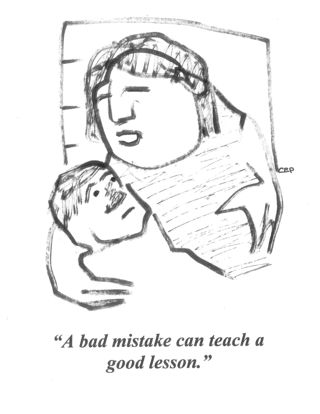Confidence
Raising a Self-Confident Adolescent
There are some things parents can do and can't do to nurture teenage confidence.
Posted March 6, 2017 Reviewed by Abigail Fagan

What can parents do to nurture self-confidence in their child and adolescent? Here are a number of parental responses that might be effective.
Encourage three pillars of self-confidence. Believe in yourself: “I can do it.” Motivate yourself: “I want to make the effort.” Commit yourself: “I will give it a good try.” Encouragement is important because low esteem or fear of failure may be holding the young person back. “Sometimes it takes feeling brave to try.”
Treat a failed attempt as evidence of trying. “You can’t lose if you fail because you will be stronger for the effort made. Besides, in most cases people determine effort, not outcome which often depends on a lot of factors not in their control. So the only failure is failing to try.” Always appreciate industry independent of outcome.
Support aspirations. Future goals inspire present efforts by creating confidence that what one wants to happen later is connected to what one does now. In childhood and in early and mid-adolescence it’s easy to be short-sighted. However, goals create far-sightedness that encourages confidence that how one invests in the present can have future payoffs. “I can work to get where I want to go.”
Turn mistakes into confidence builders. Help the adolescent learn from the error of her or his ways. Knowing how not to do it wrong again helps people understand how to do it right later on. Mistake-based education is just part of how everybody learns the hard way. “You can be confident that now you’ll know better the next time!”
Value the willingness to practice. As repetition builds competence, confidence grows. Practice is an essential work habit. “I don’t always like to practice, but I like improving when I do.”
Recognize the gifts of adversity. Engaging with and recovering from hardships takes reliance on resourcefulness and builds resilience. Rising to life challenges builds confidence. “Seeing it through, I feel stronger now than I was before.”
Support persistence. To keep after what you want in the face of frustration and failure takes dedication that builds confidence. “I don’t give up easily when I don’t get what I want the first time.”
Treat infractions as exceptions. Mistakes and misdeeds will happen. A lot of confidence depends on the parental response. "You're nothing but a problem, all you ever do is mess up," drives confidence down. Fixating on the problem makes the problem worse. Best to keep the infraction in a broad and positive perspective. "As a rule, you really take care of business and conduct yourself well. This one time you didn't, but we believe mostly you do, and we appreciate that."
Encourage problem solving. Before stepping in to fix an adolescent’s problem, give the young person a chance to struggle to find a solution first. Problem solving builds confidence. “It took some different approaches, but I finally figured it out myself.”
Give responsibilities. Contributing to the family welfare by doing chores and helping out treats the young person as a someone who has value to give, and that boosts confidence. "My parents rely on me."
Respect self-discipline. Meeting four components of self-discipline builds confidence. Complete what you start. Keep your commitments. Maintain continuity of effort. And concentrate on the task at hand. “I have what it takes to make myself accomplish what I don’t always feel like doing.”
Nourish growth with challenge. Accepting a healthy challenge like trying out a new experience or something hard can build confidence. Challenge can be the antidote to low esteem, boredom, rebellion, and escape. “I like attempting what I haven’t done before.”
Offer to help, but not too much. Because providing help can undercut self-help, don’t help so much that dependency erodes independence. Self-help builds confidence. “When I want my parents to help, they always want me to try to help myself first.”
Moderate your parental authority. When parents are too strict or commanding they can engender obedience at the expense of initiative. In this way, confidence is discouraged by dependence. Better to support the young person's self-management responsibility. “My parents taught me to decide for myself.”
Don't unload your worries. Expressing parental worry about the adolescent to the adolescent is often interpreted as a vote of no confidence by the adolescent; it’s better to confide worries to a partner or a friend. Expressing parental confidence encourages confidence in the child. “Even when I was struggling, my parents believed in me.”
Never criticize performance. Like children, adolescents still want to shine in their parent's eyes. Criticism from people whose opinion matters so much can result in hurt feelings, lowered esteem, and less motivation. Thus non-evaluative correction works best. Disagree with choices, but don’t criticize character. “My parents didn’t agree with all my decisions, but I knew they always loved who I was.”
Encounter self-criticism. Young people who are prone to criticize themselves no matter how they do keep driving self-confidence down. While self-evaluation can be instructive and boost confidence; self-criticism can be punitive and run confidence down.
Finally, consider a well-meaning response parents make than can misfire. Consider not saying to your well-performing adolescent, “We’re proud of you” or “You make us proud!” Intended as a powerful statement of approval to boost confidence, it is often received as a pressure statement that makes confidence harder to hold. Thinks the adolescent, “If I cause them to feel proud when I do well, then I can be a source of disappointment when I do not. Good feelings about themselves depend on me. If I let them down, will that lessen their love?”
So what to say? Try keeping congratulations for the child’s performance where it belongs; not with the parents but with the young person. Simply say: “Good for you!”
Carl Pickhardt is the author of the book Surviving Your Child's Adolescence.




